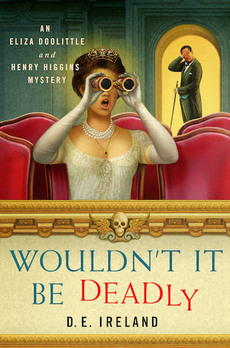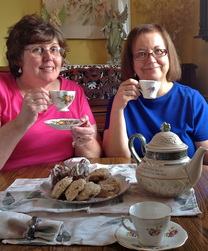|
Given that My Fair Lady is one of my favorite musicals, I was quite intrigued when I learned that D.E. Ireland had transformed the unlikely uncouple--the curmudgeonly linguistics professor Henry Higgins and the charming but inarticulate Covent Garden flower-girl--into a crime-solving duo. Loverly! I am thrilled that the two authors who comprise D.E. Ireland were able to waltz their way over to my blog today, and answer some questions about their debut novel and the writing process.  From the official blurb: Following her successful appearance at an Embassy Ball—where Eliza Doolittle won Professor Henry Higgins’ bet that he could pass off a Cockney flower girl as a duchess—Eliza becomes an assistant to his chief rival Emil Nepommuck. After Nepommuck publicly takes credit for transforming Eliza into a lady, an enraged Higgins submits proof to a London newspaper that Nepommuck is a fraud. When Nepommuck is found with a dagger in his back, Henry Higgins becomes Scotland Yard’s prime suspect...  D.E. Ireland researching high tea D.E. Ireland researching high tea SC: I know that the two of you became friends when you were undergraduates, but how did you become “D.E. Ireland?” Can you tell us a little bit about how you decided on the name? Does it mean something? DEI: We are longtime friends and critique partners and have been looking for an idea to collaborate on for years. And voila, while singing to the My Fair Lady soundtrack on her way to visit Sharon a few years back, Meg stumbled on putting Eliza and Higgins together as amateur sleuths. We plotted, outlined, then wrote the first book in the series. Since we're both published authors under our own names, we needed to choose a pseudonym. We finally agreed upon ‘Ireland’ in honor of George Bernard Shaw who was born in Dublin. And ‘D.E.’ is Eliza Doolittle backwards! SC: Your mystery features the unlikely yet beloved couple from stage and screen, Eliza Doolittle and Henry Higgins, from George Bernard Shaw’s Pygmalion (later adapted as My Fair Lady.) What was it about these characters—a guttersnipe from the dredges of London, and a professor of linguistics—that appealed to you as amateur crime-solvers? DEI: We are both huge fans of the play and the movies. Since Shaw's Pygmalion is in the public domain, we used his play and the delightful banter between Eliza and Higgins as the models for our own series' characters. However we had to flesh out their backgrounds along with that of the other characters such as Pickering, Mrs. Pearce, Mrs. Higgins and the Eynsford Hill family. In the play, Eliza worked hard to win Higgins's bet, yet she hadn't truly earned – and kept! – his respect until our series. We want to keep alive the witty exchanges these two whip at each other, and continue to expand on their friendship as they turn their collective talents to sleuthing. That should be great fun. SC: The book offers a great deal of detail about life in Edwardian London (1913). How did you conduct your research into this era? What was the most interesting or surprising thing you learned while conducting your research? DEI: We are both research hounds; Sharon wrote several historical romances set in the Old West and Victorian England, while Meg has written American western mysteries. Sharon was also a college history instructor so the opportunity to research Edwardian England seemed like great fun. We eagerly started digging into the era immediately following the death of King Edward VII. We love the two PBS series Downton Abbey and Mr. Selfridge, and both shows serve as inspiration. But we rely heavily on our "Edwardian Bible" which we have compiled that includes London shops, streets, parks, neighborhoods, food, social behavior, etc. And of course, we always refer to Shaw's Pygmalion, along with his appendices and notes of the play which include descriptions of Higgins' phonetics lab and his mother's Chelsea flat. Book 2 required that we expand our research to include horse racing, Ascot, the Henley Regatta, along with the suffragette movement. The most interesting or surprising thing? Hmm. Since electricity, autos, the telephone, and the cinema had shown up by the 1900s, perhaps it was our realization at how similar life was then to our times now -- except for fashion and manners of course. SC: Do you foresee Henry Higgins developing over time? Will he be out petitioning for votes for women in future novels? DEI: Oh, we think Higgins is the one who will be clinging to his fencepost, kicking and screaming for the old days. Eliza is the changeling of the pair and will tug and pull him into the 20th century! SC: What is the process like for you, writing as one voice? Talk us through a first draft, from brain-storming ideas and/or outlining, to “the end." DEI: We first start with an intensive, huge outline. We alternate chapters for a first draft, editing each others' work via Word's "track changes" but never stop to make any changes until after a first draft is finished. Unless something changes massively in the outline, that is -- which we usually discover half way through. Then we go through second and third drafts until "nailing it down" to a finished draft – which is followed by the "read aloud" portion. We take turns every two pages reading the manuscript to each other, altering what doesn't sound natural and fixing typos. It's exhausting, but we've completed two books without killing each other using this method. We hope to survive writing several more for the series. SC: When you’re writing, can you hear the voices from the musical singing in your head? :-) Do you ever find yourself throwing your pen to the floor and exclaiming, “Words, words, words…I’m so sick of words!” :-) Do you watch the film to be re-inspired when you feel stuck? Meg here -- I love listening to the soundtrack -- and it does help me when I'm stuck "hearing" Eliza or Higgins when writing a chapter. I watch the film just for fun, though, since we're taking the characters into a new direction. I really don't like Eliza "returning" to Wimpole Street at the end of My Fair Lady -- I think Shaw would NOT have approved of that! She's got more backbone, in my opinion. Sharon here – To keep the voices of Eliza and Higgins true to Shaw’s intention, I reread Pygmalion. I even have files listing all the favorite phrases used by each character in the play. (Alfred Doolittle is one of my favorites!) I have probably watched My Fair Lady twice since we began the series, as well as the 1938 film of Pygmalion. As a writer, I am more influenced by the written word so the play is more inspiring to me than the musical. However we try to include sly references to the musical’s songs in our books. And I always picture Audrey Hepburn and Rex Harrison as our Eliza and Higgins. SC: What advice do you have for aspiring novelists—especially those writing crime fiction? Is there anything you wish you had known when you were first starting out? DEI: Mysteries are tough to plot, especially if one tries to do it without an outline. So we make certain to have an outline that sometimes seems the length of a novella. Laying out clues and red herrings, making sure people don't easily guess the real killer, making motivations seem plausible -- it's hard work. We knew this long ago, though, because writing any genre of book is never easy. But since mysteries and crime fiction are invariably about solving a puzzle, there is an extra layer of logic and organization that seems to be necessary to plotting the perfect crime. Aspiring writers need to understand that going in, but persistence is key. And to finish any novel regardless of genre, it helps to keep in mind Winston Churchill’s famous maxim: “Never give up on something that you can’t go a day without thinking about.” SC: What is next for Eliza and Henry? Will we see other characters/ cameos from the film in future works? DEI: Move Your Blooming Corpse is set to be released in 2015. We used a real event at the 1913 Royal Ascot as our starting point; Harold Hewitt ran in front of the horses as a protest, emulating an incident at the Derby races when a suffragette was trampled by the King's horse. Not surprisingly, suffragettes appear often in the upcoming book, along with racehorses and the colorful people who own them. Dear Colonel Pickering also plays a larger role in Book 3. And Clara, Freddy’s younger sister, nearly takes center stage in Book 3 as she prepares for her upcoming society wedding. SC: Sounds terrific! Thank you for joining us today! DEI: THANKS, Susanna! Great questions. D.E. Ireland's books can be found where all books are sold, including Barnes & Noble and Amazon. Check out their website and blog too, at www (dot) deireland (dot) com, for fun stuff about their books and Edwardian England!
2 Comments
10/21/2014 08:09:37 am
A great exploration of reading for the assistance of readers. Cheers for sharing! thank you
Reply
Leave a Reply. |
Susanna CalkinsHistorian. Mystery writer. Researcher. Teacher. Occasional blogger. Categories
All
Archives
May 2023
|
 RSS Feed
RSS Feed